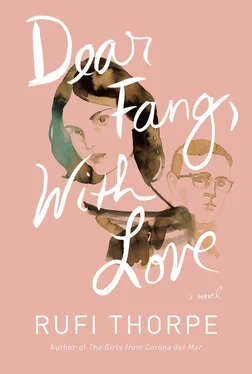“And so your grandmother always celebrated that day,” my mother would say, “as her second birthday, her rape birthday.”
The term “rape birthday” made me cringe, especially as I got older.
“Why cringe?” my mother said. “He saved her life. Rape happens. Rape is a fact of life. Nothing to be ashamed of.”
“I’m not ashamed of it,” I would say, but I was lying. I thought that rape was something shameful and terrible that a woman would not want to ever talk about. But I could still remember the cheap supermarket cakes my grandmother would buy for herself on her rape birthday, the blue flowers of lard frosting she would lick off the knife.
“Maybe,” my mother suggested, “compared to everything else, the rape was the least bad of the things that happened to her. Maybe when your entire world has been transformed and you have lost everything, your whole family, maybe then rape is just…” She trailed off.
“But why did he save her? Just because she was beautiful?” I often asked. It was a point that bothered me. What was the significance of beauty? Was Grandma Sylvia worthy of being saved just because she was beautiful? Was her sister less worthy for being ugly? I didn’t like the whole thing.
“I don’t know,” my mother would say, because she was a naturally speculative creature, too. “Maybe she became human to him. Maybe this is something the guards did occasionally. Maybe he raped her in order to have a chance to set her free outside. Who knows?”
—
So I took Vera to Vilnius.
And before we even got there, while we were still on the flight to Helsinki, we got into a terrible argument, the kind that is baffling and confusing and where one of you falls through a trapdoor you had no idea was there.
“When I was little,” she had said, deep into the blurry hours of our transatlantic flight, “I pictured tiny men inside me, using levers and pulleys to work my muscles and joints. And I pictured whole cities inside my stomach where they would take the pieces of food and mash them and work them like clay and re-form them into perfect spheres or cubes or pyramids, which they would then set, like little boats, into my bloodstream.”
“That’s a wonderful image,” I said. I had given in and ordered myself a Scotch and I was beginning to feel sleepy.
“But what if that’s true,” Vera said. “What if we’re a collective and not a single thing? What if the idea of being a person is a mistake?”
“You mean, what if there is no ‘I’?”
She nodded. She had bought a Toblerone bar at the airport and now was gobbling the dark triangles of chocolate and her breath smelled sweet in the dim cabin.
“But there is an ‘I,’ ” I said. “I mean, that’s the reason we think there is an ‘I’—because we think there is. Cogito, ergo sum. ”
“What is that?” Vera asked. “Latin?”
I tried to explain about Descartes and his meditations. Descartes was a figure I found touching. He had been very sickly and spent many hours in bed. They say that was how he invented the Cartesian graph — he was watching a fly on the ceiling from his sickbed and wishing he had a way of charting its coordinates. On the other hand, he vivisected dogs.
“What is vivisection?” Vera asked.
“Like dissection only the thing you are dissecting is still alive,” I said.
“What a freak! Who could do that to a poor little doggy?” There was chocolate all over her teeth.
I laughed. “A lot of scientists were…like that,” I said. “Anyway, cogito, ergo sum means ‘I think, therefore I am.’ ”
“I’ve heard of that,” Vera said, nodding, “but it doesn’t sound very convincing. Maybe the mind works that way, but what about the body? Did you know that there are one hundred trillion bacteria in the human body? What if they are part of us? I mean — they are. They are part of us. So why doesn’t that seem to matter to anyone? I mean, maybe I would be a different person if I had your bacteria instead of my own. Maybe I would seem like a different ‘I’ to myself.”
“Maybe,” I said. “But I don’t understand how the mechanism would work. Are you suggesting they would change your biochemistry?”
“Or whatever,” she said. “I mean, we’re altering my brain chemistry with medication in order to make me seem like a different ‘I’ to myself, aren’t we?”
That was an uncomfortable question. “Yes, but—”
“And we’re doing it against my will. It’s a kind of biochemical rape,” she said. The word rape stopped me, as it always did.
“Is it really against your will?” I asked.
“Yes,” she said quietly. “I don’t think I’m crazy.”
I didn’t know what to say. I must have waited too long.
“But you do,” she said. “You think I’m crazy.”
“No,” I began. I was thinking of the video Fang had shown me, her dark eyes, her outstretched wrist: I am the immortal light.
“Please don’t patronize me,” she said. “It was stupid of me to think you would understand. You make a show of wanting to be friends, so it gets confusing. I hope you understand that.”
“I do want to be friends,” I said, though really I suspected that was my whole problem, the trap of modern parenting: trying to befriend your children. But then, I didn’t know how to be a father. What did I have to offer besides friendship?
“I’m going to try to get some sleep,” she said, her voice shaky and cold. She took her neck pillow from under her seat, leaned it up against the window of the plane, turned her face into it and closed her eyes.
“Vera,” I said.
She said nothing.
“I didn’t mean to upset you.”
She said nothing.
“Please don’t be mad at me. I don’t know what I think. Honestly, I don’t know.”
“Could you please turn off the light?” she asked, not opening her eyes.
“Sure,” I said, and I tapped the button above us to turn off the little reading light, and then there was nothing but dim darkness and my daughter who was angry at me and Mario Batali on the tiny television in front of me demonstrating how to fillet a fish.
—
When we landed in Helsinki, it was like none of it had ever happened. Like the whole conversation had been erased. We walked shakily through the airport and boarded our flight to Vilnius, but I knew it wasn’t all right. There had been a test and I had failed it. And we hadn’t even gotten there yet.
I hadn’t told Vera the story of Grandma Sylvia’s rape birthday, in part because Katya had asked me not to. But even as we got off the plane in Vilnius and wandered the sparkling, efficient little airport, where the air smelled sharp and clean, and where all of the people were dressed so beautifully and formally (I had somehow managed to spill wine/grease/dark stuff all over the front of my polo shirt), I still thought maybe Vilnius had the magic that Vera needed, the magic that was so painfully absent in Dr. Carmichael’s office, the magic that I myself lacked and was unable to give her. In a way, Vilnius seemed like my last chance.
But a chance at what? To save Vera? To wake her up from an enchanted slumber? It was absurd. Possibly my motivations were more selfish. Vera identified as Russian because her mother was Russian, and she had grown up speaking Russian at home. She identified as Jewish because her mother was Jewish, and she had been raised going to temple, had gotten bat mitzvahed and everything. She did not identify as Polish or Lithuanian, nor did she have any interest in my family’s faded, sentimental Catholic memories. Then again, why should she? I myself hardly identified as Polish or Lithuanian. Even my mother didn’t speak a word of Polish, though her mother had been fluent. We didn’t have a culture to offer her so much as the ghost of a culture. And maybe the Grandma Sylvia story had something to do with that. I worried that at bottom, I just wanted Vera to be interested in me, in my family, to ask me questions and hear my stories and make me feel like not the worst father in the world.
Читать дальше












